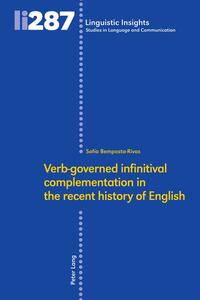
Verb-dependent non-finite complementation and, in particular, to- and bare-infinitive complement clauses have been the subject of extensive investigation and debate. The aim of this monograph is to contribute to the existing literature by modelling the variation in relation to a selection of verbs that govern to- and bare-infinite complements in the recent history of American and British English. Using methodologies provided by corpus linguistics and multivariate analyses, this book attempts to account for the forces that make certain verbs show a preference for either to-infinitive or bare-infinitive complementation from Middle English onwards, and to provide a comprehensive description of the factors that influence the choice of infinitival. Specifically, this monograph deals with morphological, syntactic and semantic/pragmatic variation between to- and bare-infinitive complementation in English, governed by, specifically, dare, need and help.